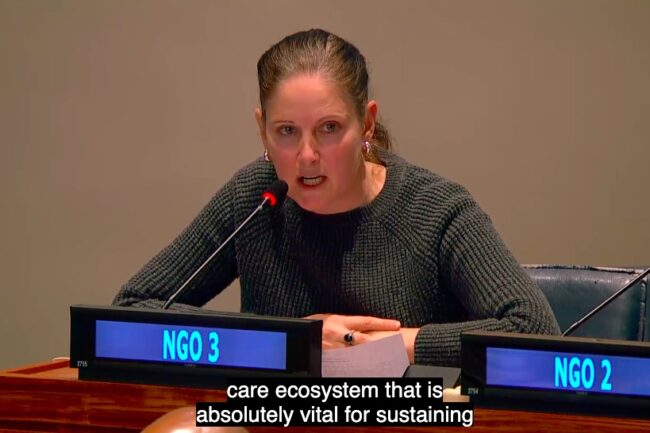Strengthening the care ecosystem: key to building a cohesive society
13.02.25
UN New York - MMM's oral statement to the UN Commission on Social Development highlighted the central and unique role of Care for social cohesion and social development, reminding the lessons drawn from the Covid-19 pandemic, and calling on governments to make care central to all policymaking and invest in care systems.

Despite calling for placing people at the centre of development and recognising families and women as key agents of social development, the Copenhagen Declaration, which was adopted at the 1995 World Summit for Social Development failed to acknowledge the crucial role of care for social development. We need to recognise that role and the urgency to move from a corporate profits-centred economy to a care-oriented economy.
The Covid-19 crisis shed light on the fundamental role of (under)paid and unpaid care work for the sustainability of life and the functioning of society, and how it underpins development and all other types of economic activity. The pandemic also exposed the inequitable distribution of care work, which remains undervalued and mostly invisible, and which is at the root of gender inequalities and a cause of economic injustice, poverty and social exclusion for women, in particular when they are mothers.
However, the current development model, which prioritises GDP growth and capital accumulation for a few, fails to acknowledge, protect and invest in this care ecosystem that is absolutely vital for sustaining a cohesive society.
It also fails to recognise care as a common responsibility that must be distributed more equitably between men and women, and also across society, with every stakeholder, including families, communities, the private sector and governments, taking their share of responsibility and costs.
The benefits of shared caregiving and transforming to a care society are far-reaching: it is key to thriving individuals, families and societies, and it could contribute to building a more caring, equal, and less violent world.
MMM therefore called on Member States to reaffirm that everyone has caring responsibilities, to make care central to all policymaking and to invest in care systems. This is not just a necessity, it’s an imperative.
The 63rd UN Commission on Social Development (CSocD63) took place 10-13 February at the UN headquarters in New York under the theme: Strengthening solidarity, social inclusion and social cohesion to accelerate the delivery of the commitments of the Copenhagen Declaration on Social Development and Programme of Action of the World Summit for Social Development as well as the implementation of the 2030 Agenda for Sustainable Development.
See also
→ MMM’s written statement to the Commission calling for mothers to be recognised and supported as essential drivers of social development
The New EU Gender Equality Roadmap : A Call for Inclusion of Mothers
04.03.25
The European Commission’s initiative on a new Gender Equality Roadmap post-2025, marks a significant step forward in addressing gender disparities across the European Union. Make Mothers Matter (MMM
Breaking the Cycle: Gender Equality as a Path to Better Mental Health
18.03.25
The Council of the European Union has taken a decisive step in recognising the vital connection between gender equality and mental health.
Europe Must Listen to Mothers: Our landmark report heads to the European Parliament
28.08.25
On 22 September 2025, the voices of mothers will take centre stage in Brussels. For the first time, Make Mothers Matter (MMM) will present its State of Motherhood in Europe








